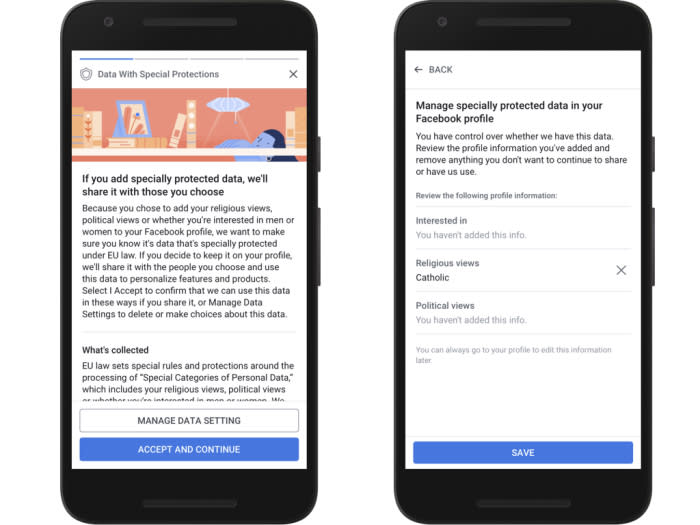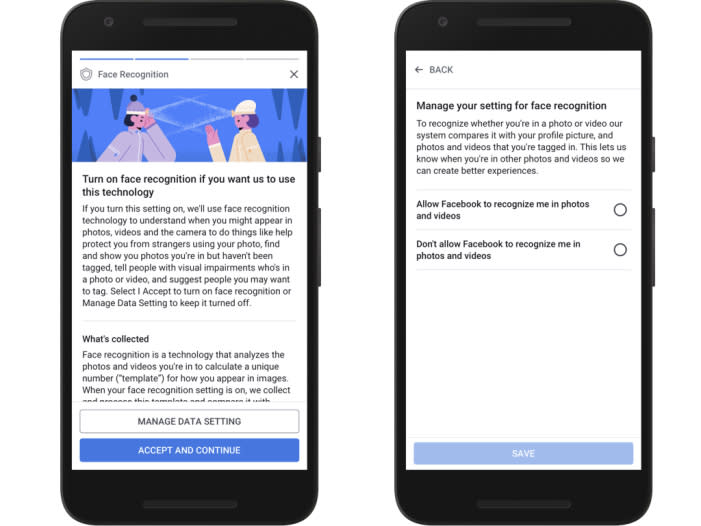Facebook privacy rules are changing (again) - here’s what you need to know

Facebook’s privacy settings are notoriously complicated and difficult to get to grips with – and they’re about to change once again.
In the coming days, all European Facebook users will be asked to review their privacy settings – and how much information they share with Facebook.
It’s not a knee-jerk reaction to the Cambridge Analytica scandal – it’s to do with new European privacy regulations, the General Data Protection Regulation (GDPR), which come into force on May 25.
MOST POPULAR TODAY ON YAHOO
Plague of rats ‘the size of small dogs’ chewing through car cables as they take over English town
Scary Obama video highlights how ‘Deepfake’ videos are the next stage of ‘fake news’
‘Animals make funny sounds and smell bad’: Farmer puts up scathing sign for complaining ‘townies’
Flip phones are making a comeback as everyone gets sick of social media
Facebook has avoided these regulations for users outside Europe, by moving non-EU users to being governed by Facebook Inc in the U.S. rather than Facebook Ireland.
This move will mean that up to 70% of Facebook users won’t be subject to Europe’s tough new privacy laws (which will remain in place in Britain even after Brexit).
All users in the UK will have to agree to a new set of regulations and privacy rules in the EU in the coming days – and users elsewhere will also have to review their privacy settings.
Erin Egan, VP and Chief Privacy Officer, Policy said, ‘We’re introducing new privacy experiences for everyone on Facebook as part of the EU’s General Data Protection Regulation (GDPR), including updates to our terms and data policy.
‘Everyone – no matter where they live – will be asked to review important information about how Facebook uses data and make choices about their privacy on Facebook. We’ll begin by rolling these choices out in Europe this week.’
Here’s what the new rules mean.
Websites which track you

Users will be asked to choose whether to opt for ‘ads based on data from Facebook partners’ – in other words, sites and apps which track you using Facebook tools.
Facebook has done this for years, but users will now be asked whether they want ads ‘personalised’ using data from websites they visit.
Facebook says, ‘We’ll ask people to review information about this type of advertising, and to choose whether or not they want us to use data from partners to show them ads.’
Your profile information
Facebook’s new privacy settings will also walk you through the information you share on your profile – such as relationship status and political leanings.

Revealing details about your personal politics or your religious leanings can put employers off, security experts at Norton warn.
Facebook will now ask all users to review what they’ve shared and give the option to delete it.
Facebook says, ‘we’ll ask you to choose whether to continue sharing and letting us use this information. Including this information on your profile is completely optional. We’re making it easier for people to delete it if they no longer want to share it.’
Face recognition
Facebook has started contacting users about facial recognition this week.
Users are asked to click a single button to “accept and continue” if they want to turn on facial recognition, but if they want to turn it off, they must take a little more time by going into their “manage data setting” options.
The software will allow the social network to recognise people in pictures, letting their friends tag them online.
The technology is already used in the US to tag people in photos, but Facebook was forced to drop similar plans for EU users in 2011 after protests from privacy campaigners and regulators.
Facebook is now explicitly asking European users for consent to facial recognition pic.twitter.com/YErXPGjFPE
— Jennifer Cobbe (@jennifercobbe) April 16, 2018
Facebook has introduced the opt-in ahead of GDPR – but not all experts are convinced that the ‘biometric’ technology complies with the terms of the regulations.
Ireland’s data protection commissioner Helen Dixon told the BBC: ‘There are a number of outstanding issues on which we await further responses from Facebook.
‘In particular, the Irish DPC is querying the technology around facial recognition and whether Facebook needs to scan all faces – i.e. those without consent as well – to use the facial recognition technology.
‘The issue of compliance of this feature with GDPR is therefore not settled at this point.’
Facebook’s updated terms of service
A key feature of GDPR is to stop companies assuming they have rights to people’s data – instead people have to actively consent.
This means all Facebook users will have to agree to letting Facebook use their data.
Facebook says that the new Terms of Service don’t give it any additional rights over customer data – but that they make clearer how people’s data can be used.

Facebook says, ;’We will also ask people to agree to our updated terms of service and data policy, which include more detail in response to questions about how our services work. We’re not asking for new rights to collect, use or share your data on Facebook.’
New privacy shortcuts
This change was well overdue, so it’s a welcome part of the Facebook GDPR updates – it’s made its privacy menus clearer and easier to access.
Facebook says, ‘The new Settings and Privacy Shortcuts features we announced last month were built with GDPR in mind, and people will start seeing them this week. Our recently-expanded tools for accessing your information will allow people to see their data, delete it, and easily download and export it.’
New rules for users aged 13-18
Facebook has revamped the rules for young users – who will now require parental consent for features such as sharing political views on their profiles.
Facebook has turned off facial recognition for users under 18, and blocks them from setting their posts to Public.
Other features require parental consent.
Facebook says, ‘Under GDPR, people between the ages of 13 and 15 in some EU countries need permission from a parent or guardian to allow some features on Facebook — seeing ads based on data from partners and including religious and political views or “interested in” on your profile.’


